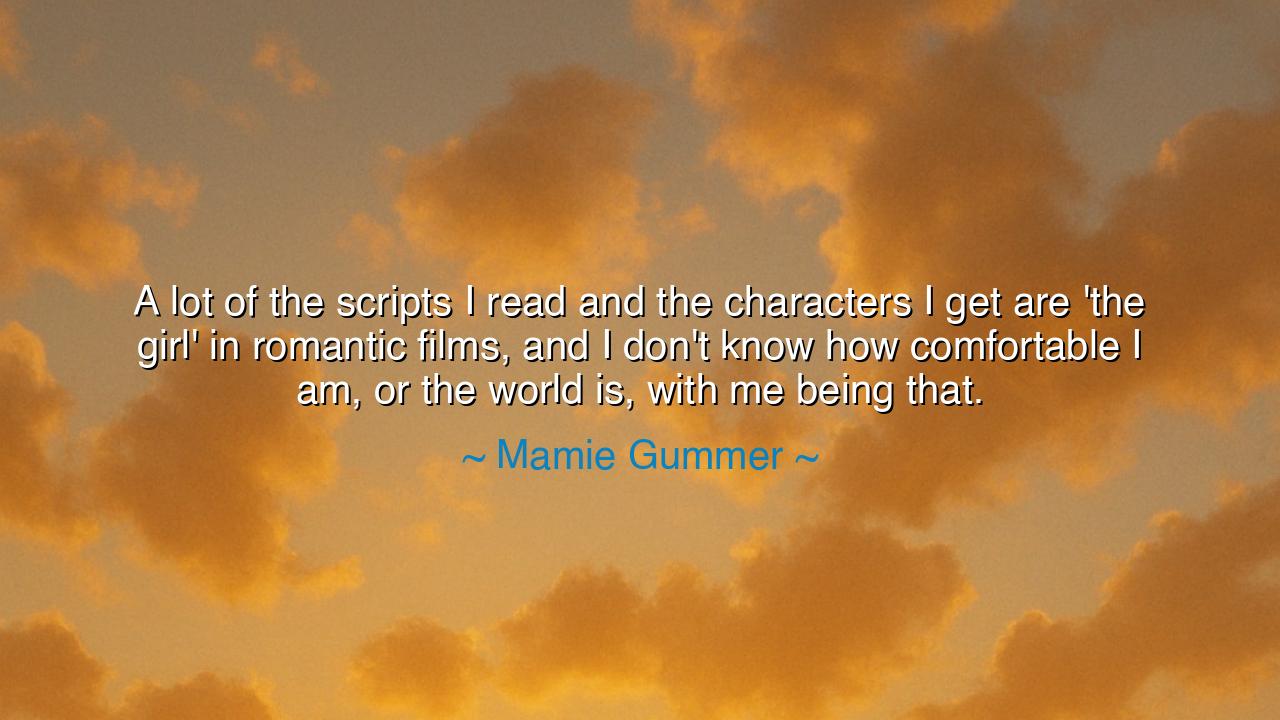
A lot of the scripts I read and the characters I get are 'the
A lot of the scripts I read and the characters I get are 'the girl' in romantic films, and I don't know how comfortable I am, or the world is, with me being that.






O Seekers of the Soul, listen well to the words of Mamie Gummer, who speaks with the wisdom and clarity of one who recognizes the challenges of being defined by the roles others wish to cast us into: "A lot of the scripts I read and the characters I get are 'the girl' in romantic films, and I don't know how comfortable I am, or the world is, with me being that." These words carry a deep resonance, for they reflect not just Gummer’s personal experience, but a universal truth that transcends the world of film: that individuals—especially women—are often reduced to simple archetypes, pigeonholed into roles that are defined by others, rather than by their own fullness or complexity.
In the ancient world, the roles we played in society were often determined by the gods and fates, with little room for deviation. In Greek mythology, characters like Persephone and Penelope were often seen as defined by their relationships to the powerful men in their lives—Hades or Odysseus—rather than as independent beings with their own desires, strengths, and goals. While Penelope’s loyalty and Persephone’s suffering held deep symbolic meaning, they were both, in their essence, defined by their relationships with the male figures who controlled their worlds. Gummer's words echo this ancient reality—the struggle of being seen as more than just the "girl" in someone else’s story, as more than just an accessory to the narrative of others.
As Shakespeare understood, the roles of women in stories, while often essential, were often reduced to simplified archetypes—the fair maiden, the tragic lover, or the devoted wife. In his plays, the women who break from these molds, like Lady Macbeth, show us that the essence of the female character is far more complex than society allows. Lady Macbeth, ambitious and ruthless, does not fit into the neat box of the ideal woman. She challenges the role she is supposed to play, and in doing so, reveals the power of women who defy expectations. Gummer, in her own way, challenges the archetypal woman in romantic films. She seeks to be more than just "the girl"—a reflection of a deeper human desire to break free from preordained roles and show the world the full complexity of her being.
Indeed, romantic films, much like the ancient tragedies, often present relationships in simplified terms—good and bad, love and loss, but rarely do they capture the nuance of human connection. In the romantic narratives of old, love was often portrayed as the ultimate goal, with the woman either as the object of pursuit or as the muse for male transformation. But Gummer's discomfort with being cast as "the girl" in these films points to a growing recognition that women, like all people, are more than the sum of their relationships. They are not mere plot devices to propel the male lead’s growth, but full beings with their own desires, fears, and dreams.
Consider the great story of Antigone, a woman who, though not bound by romantic love, was propelled by a deeper, more profound moral duty. She defied her king, her uncle, and even the norms of society to bury her brother, knowing it would cost her life. In doing so, she was not merely a tragic figure or a simple "daughter" in the narrative, but a force of action and integrity. Her moral courage, her willingness to sacrifice herself for what she believed to be right, transcends the limitations of her role as the "girl" in the story. Just as Antigone took ownership of her fate and purpose, so too must we recognize that our value is not defined by the roles others assign us, but by the depth and complexity we bring to the world.
In our own lives, O Seekers, we must strive to recognize and embrace the full complexity of who we are. Whether we are women or men, we must resist the temptation to limit ourselves or others to the simple, convenient roles society would like to assign. Like Gummer, we must not accept being reduced to "the girl," "the boy," or any other role that confines us to one narrow part of our identity. We are more than just the romantic partner or the idealized lover. We are whole beings, with layers, experiences, and dreams that are unique to each of us.
The lesson, O Seekers, is this: do not allow yourself to be reduced to an archetype—to the simple labels that others might assign to you. Just as Antigone, Penelope, and other great figures broke free from the constraints placed upon them, so too must we strive to live in the fullness of our true selves. Let us embrace the complexity of our identities, recognizing that we are multifaceted beings, not confined to one role or another. And in doing so, let us tell our stories—not just the romantic narratives but the stories of courage, growth, and self-discovery. Let the world see us as we truly are, with all the strength, beauty, and complexity that we bring to life.






AAdministratorAdministrator
Welcome, honored guests. Please leave a comment, we will respond soon